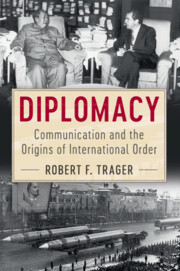Book contents
- Frontmatter
- Dedication
- Contents
- List of Figures
- List of Tables
- Preface
- 1 Can Adversaries Communicate?
- 2 How Perceptions of Intentions Form
- PART I THEORY
- 3 The Scope of Demands
- 4 The Risk of a Breach
- 5 Balancing Allies and Adversaries
- 6 Diplomatic Approaches
- PART II EMPIRICAL ANALYSIS
- APPENDICES
- References
- Index
4 - The Risk of a Breach
from PART I - THEORY
Published online by Cambridge University Press: 25 October 2017
- Frontmatter
- Dedication
- Contents
- List of Figures
- List of Tables
- Preface
- 1 Can Adversaries Communicate?
- 2 How Perceptions of Intentions Form
- PART I THEORY
- 3 The Scope of Demands
- 4 The Risk of a Breach
- 5 Balancing Allies and Adversaries
- 6 Diplomatic Approaches
- PART II EMPIRICAL ANALYSIS
- APPENDICES
- References
- Index
Summary
During the Great Eastern Crisis of 1876, Russia queried Germany what its position would be if Russia were to go to war with Austria–Hungary. Russia and Austria–Hungary were engaged in tense negotiations over the Russian desire to respond to Ottoman violence against Slavs. Germany did not wish to reply to Russia at all, but learned that the Tsar was asking about the German response nearly every day. So, Germany sent General von Schweinitz by train to a private audience with Tsar. Schweinitz communicated, as delicately as he possibly could, that Germany could not guarantee its neutrality in the event of war, and that “a lasting weakening of Austria would be contrary to [German] interests.” The German chancellor, Otto von Bismarck, thought that this created a “new situation” in European politics. Germany had increased Russian expectations about Germany's willingness to go to war on behalf of Austria, and perhaps decreased Russia's appraisal of the extent to which Germany would support Russian aims generally.
According to most theories of communication between states, this should have been impossible. Germany communicated its position privately through diplomatic channels. Thus, German elites did not stake their reputation before a domestic audience, nor did their actions carry explicit costs, two commonly recognized mechanisms of communication. Further, Germany's noncommittal statements can hardly be considered to have engaged its reputation before the Russian and interstate audiences such that anyone could have believed Germany significantly less willing to back down for fear of the repercussions of having been caught in a bluff. Theories of communication that rely on the staking of bargaining reputations, therefore, also fail to explain the case. Yet, Bismarck's appraisal was correct: thereafter, Russia reckoned on German support for Austria–Hungary. Why should the statements of ambassadors have such an impact?
This chapter describes a signaling mechanism that explains this case and many others. When a state is threatened, if it is not willing to concede the issue, and sometimes even if it is, it will often reorient its foreign policy. It may form new alliances, build weapons, initiate a first strike against the threatener, mobilize troops, or adopt policies to drain the resources of the menacing state. These actions have consequences for the threatening state whether or not that state decides to follow through on its threat.
- Type
- Chapter
- Information
- DiplomacyCommunication and the Origins of International Order, pp. 71 - 102Publisher: Cambridge University PressPrint publication year: 2017



